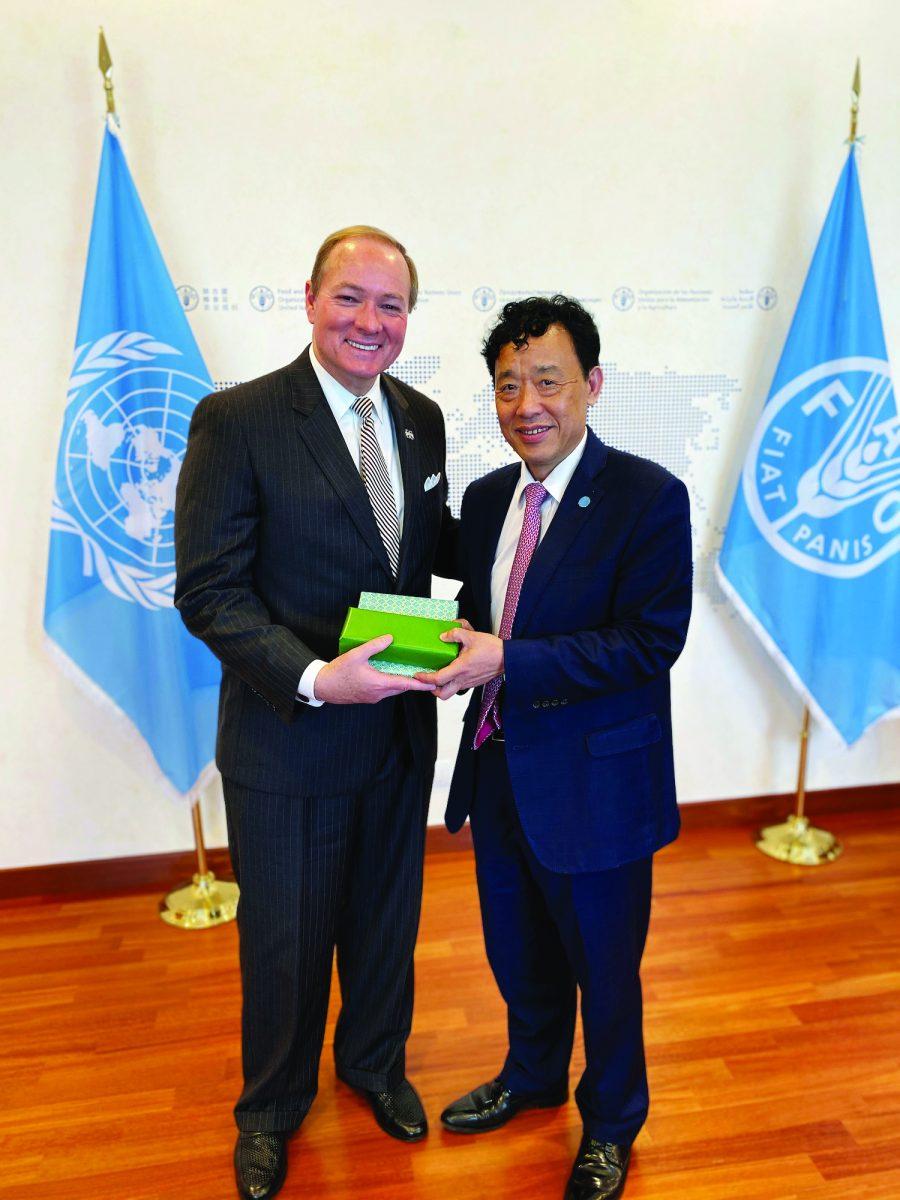Mississippi State University President Mark E. Keenum delivered a speech at the United Nations Food and Agriculture Organization headquarters in Rome last week.
Keenum described the strides research institutions like MSU have made to address global challenges such as hunger and poverty.
“American universities, and particularly land-grant institutions such as Mississippi State University, are well equipped to help governments, international organizations like FAO, the private business sector and NGOs (non-governmental organizations) in addressing these pervasive problems,” Keenum said. “Land-grant universities have knowledge, infrastructure and experience pertinent to every aspect of the food chain, from the laboratory to the farm to the market to the table. Our challenge is to bring our resources to bear on critical global issues.”
Keenum’s professional past boasts of a strong background in food security, including his past service as Under Secretary of Agriculture for Farm and Foreign Agricultural Services for the United States Department of Agriculture.
This passion for agricultural development is also highlighted in Keenum’s current career as a chairman for both the Foundation for Food and Agriculture Research and the Board of International Food and Agriculture Development.
Keenum said he believes agriculture is one solution to the many challenges of the 21st century.
“We know that agriculture is a key to transforming developing nations and reducing poverty,” Keenum said. “We also know that for the United States, investing in international agriculture aid pays dividends domestically.”
According to their website, the FAO is an organization dedicated to achieving a future without world hunger, poverty or malnutrition. It seeks to obtain this with the help of partner organizations like MSU in a sustainable manner.
During his time in Rome, Keenum also signed agreements expanding MSU’s partnership with the FAO.
Three new programs that offer international internships and partnerships for students, alumni and faculty members will be created from the agreements.
MSU Provost and Executive Vice President David Shaw, who was in attendance with Keenum during the FAO meetings, said he sees enormous opportunity for the current and future MSU students in the expanded partnership.
“We see immense opportunities for our students to gain experience that they simply couldn’t get through other mechanisms, helping them better understand both the issues and be part of solutions that are developed,” Shaw said. “We see life-changing opportunities through these internships.”
According to Shaw, the world population is set to reach 10 billion people by 2050. Shaw said he believes every discipline on MSU’s campus is capable of meeting any upcoming challenges.
“Every college on our campus has capability relevant to addressing the many challenges of a growing world,” Shaw said. “I’m very proud of the way our faculty and students are recognizing the responsibility we have and applying their expertise to develop solutions.”
Shaw said MSU’s dedication to finding global solutions to hunger and poverty comes directly from Keenum’s firsthand experience with the reality of both, and that his passion has allowed the university to become more engaged and collaborative with its partners.
Director of the International Institute and Interim Vice President for Research and Economic Development Julie Jordan also joined Keenum and Shaw in Rome.
Jordan said the three MSU representatives met with existing university partners, including the University of Rome Tor Vergata and the University of Arkansas Rome Center, throughout the four-day trip.
In the days following the FAO meeting, Keenum, Shaw and Jordan attended meetings with Jennifer Harhigh, deputy chief of Mission to the U.S. Mission to the United Nations Agencies in Rome, and David Beasley, executive director of the UN World Food Program.
Back at home, MSU is contributing to research and development for new solutions to centuries-old issues.
Jordan said, as a top-10 agricultural research institution, MSU is home to the Feed the Future Innovation Lab for Fish, a project by the U.S. Agency for International Development that’s focused on improving aquacultures and fisheries in a group of target counties in Africa and Southeast Asia.
According to Jordan, this is only one in a list of research endeavors MSU is currently undertaking.
“We have researchers developing SMART farms in Ghana through the Soybean Innovation Lab enhancing small farmer livelihoods. Our veterinarians are helping address transboundary animal health issues and working with the FAO to establish best practices for animal health during natural disasters and other crises,” Jordan said. “These international programs have a direct, positive impact on agriculture and food security in developing nations.”
Provost Shaw also acknowledged the efforts MSU is making for food security on campus and within the community.
“In addition to national and international initiatives, I’m proud of the steps we are taking to address food insecurity and hunger on our campus and in our community,” Shaw said. “Programs like Block by Block and Maroon Meals are helping our students connect with the food resources they may need.”
Shaw said the expanded partnerships with the FAO could be the first step toward many more future collaborations.
“I see many more opportunities for our students and faculty in Rome in our future, and I’m excited about the momentum we have with study abroad, student and faculty exchanges and other international engagement activities,” Shaw said. “These programs enrich us as individuals and as an institution.”
When in Rome: Keenum, FAO fight global food insecurity
Megan Bean | The Reflector
MSU President Mark Keenum met with FAO Director-General Qu Dongyu last week in Rome.
0
Donate to The Reflector
Your donation will support the student journalists of Mississippi State University. Your contribution will allow us to purchase equipment and cover our annual website hosting costs.
More to Discover













